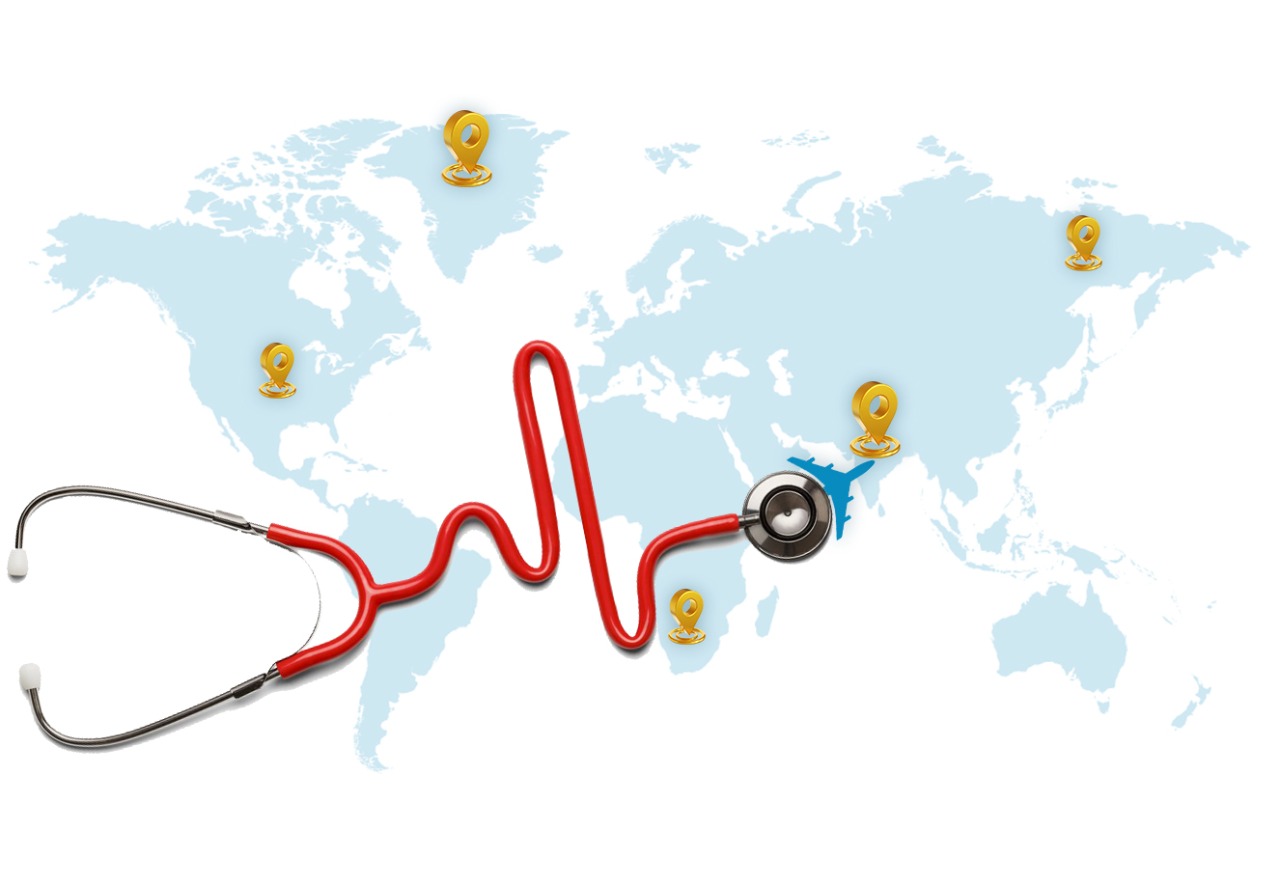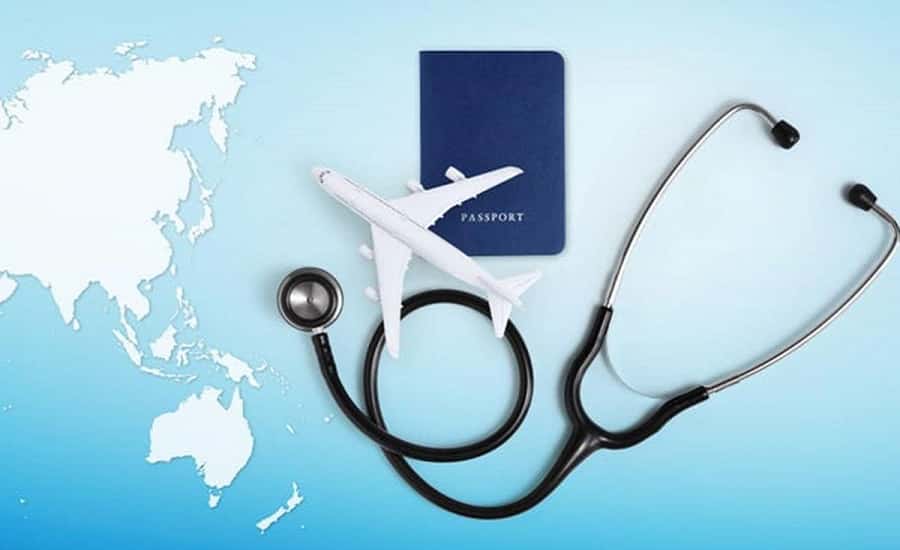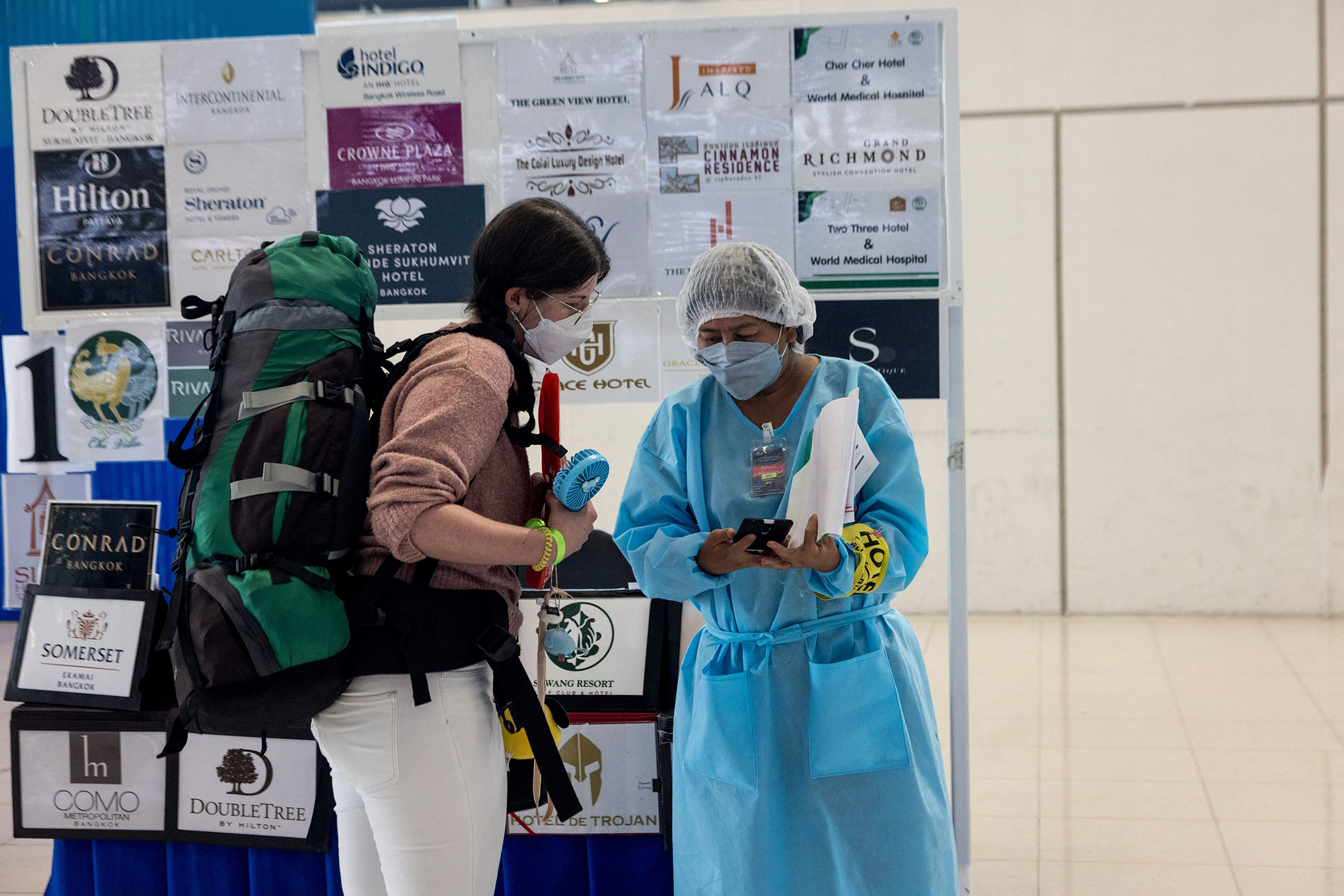Exploring The World Of Medical Tourism - Bridging Healthcare And Travel
In recent years, a new trend has emerged that combines two seemingly unrelated aspects of human life: healthcare and travel. This phenomenon, known as medical tourism, has gained significant traction as people seek high-quality medical treatments while exploring new destinations around the world.
Author:Suleman ShahReviewer:Han JuMay 18, 2023160 Shares80.1K Views

In recent years, a new trend has emerged that combines two seemingly unrelated aspects of human life: healthcare and travel. This phenomenon, known as medical tourism, has gained significant traction as people seek high-quality medical treatments while exploring new destinations around the world. This article delves into the concept of medical tourism, its benefits, challenges, and the impact it has on healthcare systems and economies globally.
Understanding Medical Tourism
Medical tourismrefers to the practice of individuals traveling to other countries to seek medical treatment, procedures, or surgeries. This trend has evolved due to various factors, including the rising costs of healthcare in certain countries, long wait times for medical procedures, and the desire for access to advanced treatments that might not be available domestically. As a result, patients are venturing beyond their borders to receive healthcare services that cater to their specific needs.
Benefits Of Medical Tourism
Cost
Medical tourism is a global phenomenon of significant economic magnitude, with projections indicating substantial growth in the coming decade. The primary determinant for individuals seeking healthservices is the financial aspect, as the cost plays a pivotal role in their decision-making process to pursue medical treatment overseas.
The health care sectorencompasses two primary dimensions of service quality: technical or mechanical quality, and serviceable or functional quality. The diagnostic algorithm relies on technical equipment, but the quality of service provided in healthcare centers, including the performance of staff members, nurses, doctors, and their assistants, determines the functional quality. The provision of high-quality services within the medical tourism business plays a crucial role in the attraction of customers.
The level of confidence can be further enhanced when accreditation is accompanied by a partnership with famous hospitals or healthcare systems in developed nations. Once healthcare providers get accreditation and join worldwide referral networks, they can be effectively evaluated for potential dangers.
The notion of insufficient quality stands as a primary obstacle to the acceptance of medical tourism. One crucial factor in addressing this challenge is the implementation of appropriate marketing tactics and the evaluation of quality through accreditation from a globally recognized institution. The acquisition of such accreditation plays a crucial role in enhancing trust in the healthcare system's quality.
Quality
The ability of clinics and hospitals in developing countries to reduce their prices is primarily attributed to the economic conditions prevailing in the nation. The observed relationship is a direct association between the per capita gross domestic product (GDP) of a country and its income levels, with per capita GDP serving as a proxy for income. Consequently, the countries that actively promote medical tourism provide surgical proceduresat prices that are 30% to 70% lower than those in the United States.
With the escalating healthcare expenditures in the United States and various other regions, there has been a growing interest among employers and insurance companies in exploring medical tourism as a potential strategy to mitigate these expenses. An increasing number of governments worldwide are beginning to recognize the economic advantages associated with this burgeoning industry, prompting them to provide high-quality medical services at significantly reduced costs.
Timely Access To Care
In some countries, long waiting times for certain medical procedures are a common issue. Medical tourists can bypass these delays by traveling to destinations where the healthcare system offers quicker access to specialized treatments. This not only aids in timely medical intervention but also contributes to better health outcomes.
Combining Health And Leisure
Medical tourism isn't solely about medical procedures. It provides an opportunity for patients to combine healthcare with leisure. Patients can undergo treatments and then recuperate in picturesque locations, aiding their recovery process while enjoying the sights and experiences of a foreign destination.
Challenges And Considerations
Language And Cultural Barriers
While medical tourism offers a plethora of benefits, it's not without its challenges. Language barriers can pose communication difficulties between patients and medical practitioners. Additionally, cultural differences might influence patients' expectations and perceptions of care.
Post-Treatment Follow-Up
Aftercare and follow-up appointments are crucial components of successful medical treatment. For medical tourists, arranging and coordinating these aspects from afar can be complex and may impact the continuity of care.
Quality Assurance
Different countries have varying medical standards and regulations. Ensuring that the quality of care and medical facilities meets international standards is of utmost importance. Extensive research and due diligence are required before selecting a destination for medical treatment.
The Global Impact
The rise of medical tourism has far-reaching effects on both the healthcare industry and the economies of destination countries.
Boosting Local Economies
Medical tourism can be a boon for local economies, generating revenue from medical procedures, accommodations, transportation, and tourism-related activities. It can lead to job creation and an influx of foreign currency.
Strain On Local Healthcare Systems
While medical tourism can inject funds into destination countries' healthcare systems, it can also strain these systems if not managed properly. Balancing the needs of local residents and medical tourists can be a delicate task.
Sharing Of Medical Knowledge
Medical tourism facilitates the exchange of medical knowledge and practices between countries. It encourages cross-border collaboration and the dissemination of innovative medical techniques.
Ethical Considerations
As the medical tourism industry grows, ethical considerations come to the forefront. It's essential to ensure that medical tourists receive appropriate care and that the pursuit of profit doesn't compromise patient safety or the integrity of medical services.
Emerging Trends In Medical Tourism
As the world of medical tourism continues to evolve, several emerging trends are shaping the way patients approach healthcare and travel.
Telemedicine And Pre-Travel Consultations
Advancements in telemedicinehave revolutionized how medical tourists interact with healthcare providers before even embarking on their journey. Virtual consultations enable patients to discuss their medical needs, share records, and receive initial assessments, streamlining the planning process and ensuring that patients are well-informed before making travel decisions.
Wellness Tourism
Beyond medical treatments, a new dimension of medical tourism is emerging—wellness tourism. This trend focuses on preventative healthcare, holistic treatments, and wellness retreats. Medical tourists are increasingly seeking destinations that offer not only medical procedures but also relaxation, rejuvenation, and lifestyle improvements.
Data-Driven Decision-Making
Data analytics and digital health solutions are playing a pivotal role in enhancing the medical tourism experience. Patients can now research and compare destinations, healthcare facilities, and treatment outcomes based on empirical data and patient reviews, allowing for more informed decisions.
Destination Specialization
Certain countries are becoming renowned for specific medical procedures or treatments. This specialization attracts patients seeking highly specialized care. For instance, countries like Thailand and India have gained prominence for cosmetic surgeries, while othersfocus on procedures like cardiac surgeries or fertility treatments.
Navigating The Future - Recommendations
As medical tourism continues to grow and transform, it's important for all stakeholders to work together to ensure a sustainable and ethical industry. Here are some recommendations for patients, healthcare providers, and policymakers:
For Patients:
- Conduct thorough research on potential destination countries, healthcare facilities, and medical practitioners.
- Seek pre-travel consultations and second opinions to make well-informed decisions about medical procedures.
- Consider language barriers, cultural differences, and post-treatment follow-up arrangements when planning medical travel.
For Healthcare Providers:
- Maintain open communication with potential medical tourists and provide clear information about treatments, risks, and expectations.
- Embrace telemedicine to facilitate remote consultations and follow-up care for international patients.
- Adhere to international quality and safety standards to ensure patients receive optimal care.
For Policymakers:
- Develop comprehensive regulations to ensure patient safety, quality of care, and ethical practices in the medical tourism industry.
- Foster collaboration between healthcare professionals, tourism boards, and government agencies to create a conducive environment for medical tourists.
- Invest in infrastructure and training to support the influx of international patients without compromising the care of domestic populations.
Overcoming Challenges - Strategies For A Sustainable Medical Tourism Industry
As the medical tourism industry gains momentum, it faces a range of challenges that require innovative strategies to ensure its sustainability and continued growth.
Standardization Of Care
To ensure the quality and safety of medical treatments, there is a pressing need for international standardization of medical procedures, regulations, and ethical practices. Collaboration between countries, medical associations, and regulatory bodies can help establish guidelines that protect patients and maintain the integrity of medical services.
Post-Treatment Follow-Up Solutions
Addressing the challenge of post-treatment follow-up for medical tourists requires creative solutions. Telemedicine platforms can play a crucial role in enabling patients to connect with their healthcare providers after returning home, ensuring that recovery is monitored and any complications are promptly addressed.
Building Trust And Transparency
Trust is paramount in the medical field, and the same holds true for medical tourism. Healthcare providers and destinations must prioritize transparency in sharing accurate information about medical procedures, costs, and potential risks. This transparency fosters trust between patients and providers, contributing to positive patient experiences.
Strengthening Ethical Practices
Ethical considerations are a cornerstone of the medical tourism industry. To promote ethical practices, healthcare providers must ensure that patients' welfare remains the top priority. Destinations should actively discourage "medical tourism packages" that prioritize profit over patient well-being.
Innovations Shaping The Future
The future of medical tourism is being shaped by a range of innovative technologies and approaches that promise to enhance patient experiences and streamline processes.
Virtual Reality Medical Tourism
Virtual reality (VR) is revolutionizing how patients engage with medical tourism. Through VR, patients can take virtual tours of healthcare facilities, explore destinations, and even witness a procedure before making travel decisions. This immersive experience empowers patients with more information and confidence in their choices.
Blockchain For Medical Records
Blockchain technologyoffers a secure and transparent way to manage medical records across borders. Patients can have ownership of their medical data, granting them the ability to share records with healthcare providers in different countries, thus ensuring continuity of care.
AI-Powered Medical Assistance
Artificial intelligence(AI) is playing a pivotal role in improving patient care and experiences in medical tourism. Chatbots and AI-powered assistants can provide instant answers to patients' queries, assist with travel arrangements, and even offer personalized aftercare recommendations.
Personalized Medical Travel Platforms
Technology is enabling the development of personalized medical travel platforms that match patients with the most suitable destinations and healthcare providers based on their medical needs, preferences, and budgets. These platforms streamline the decision-making process and enhance the overall patient journey.
Risks
The likelihood of experiencing difficulties is contingent upon various factors, including the specific location of travel, the quality of the medical facility where the treatment is conducted, and the overall health condition of the traveler in relation to the intended procedure(s). There are additional factors that can elevate the likelihood of difficulties for a tourist.
Infectious Diseases
Infection is a potential risk associated with all medical operations. Complications arising from medical procedures conducted in other nations encompass a range of adverse outcomes, including wound infections, bloodstream infections, infections transmitted by donors (in the context of transplantations or transfusions), as well as the contraction of diseases such as hepatitis B, hepatitis C, and HIV.
The Phenomenon Of Antimicrobial Resistance
The emergence of extensively drug-resistant bacteria and fungi has resulted in the occurrence of illness outbreaks within the population of individuals engaging in medical tourism. Antimicrobial resistance occurs when microorganisms acquire the capacity to evade the effects of pharmaceutical agents, specifically antibiotics, which are commonly employed for the purpose of combating infections. The issue of antimicrobial resistance is a widespread concern on a global scale. Inadequate infection control procedures in healthcare institutions in other countries may pose a potential concern for medical tourists, increasing their susceptibility to acquiring drug-resistant infections.
The Assessment Of Healthcare Services Provided
Certain countries may have lower standards for maintaining licensure, credentialing, and accreditation compared to the requirements in the United States. Counterfeit pharmaceutical products and substandard medical gadgets may be employed in certain nations.
Communication
Engaging in effective communication with personnel at the designated location and healthcare establishment may present difficulties. Receiving healthcare services in a place where one lacks fluency in the language may result in potential misinterpretations and misconceptions regarding the provision of care.
Air Travel
The act of flying subsequent to a surgical procedure has the potential to elevate the likelihood of developing blood clots, such as deep vein thrombosis. Postponing air travel for a duration of 10–14 days subsequent to significant surgical procedures, particularly those pertaining to the thoracic region, will effectively mitigate potential hazards related to alterations in atmospheric pressure.
Coordinated Provision Of Healthcare Services To Individuals Over Time
It is possible that individuals who have recently returned from travel may require medical attention in the United States in the event of post-travel difficulties. The cost of post-treatment care for problems may be substantial. The duration of treatment may be extended and could potentially lack coverage under your health insuranceplan.
Popular Medical Tourism Destinations
- Bangkok, Thailand: Renowned for its exceptional healthcare facilities, Bangkok offers a wide range of medical procedures, including cosmetic surgery, dental treatments, and wellness retreats. Thailand is not only a place of beauty beaches, also great surgeons.
- Mumbai, India: India is a hotspot for medical tourists seeking affordable yet high-quality medical treatments. Mumbai's medical facilities are known for their advanced technology and experienced specialists.
- Singapore: Singapore boasts world-class medical institutions, making it a top choice for patients seeking cutting-edge treatments and a combination of medical care and luxury travel experiences.
- Istanbul, Turkey: Turkey is becoming increasingly popular for various medical procedures, including hair transplants, cosmetic surgery, and fertility treatments. Istanbul's medical centers offer modern facilities and skilled medical professionals.
- Seoul, South Korea: South Korea is known for its advanced cosmetic and plastic surgeryprocedures. Seoul's clinics attract patients seeking the latest in aesthetic treatments.
- Dubai, UAE: Dubai's state-of-the-art healthcare facilities, along with its luxury offerings, make it a sought-after destination for medical tourists seeking wellness and elective treatments.
- Budapest, Hungary: Hungary is a hub for dental tourism, with Budapest offering high-quality dental treatments at competitive prices, along with its rich cultural heritage.
- Mexico City, Mexico: Mexico is popular for its proximity to North America and its affordability. Patients often travel to Mexico City for dental work, weight loss surgery, and more.
People Also Ask
Which Country Has The Best Medical Tourism?
Countries like Thailand, India, Singapore, South Korea, and Turkey are often considered top contenders in the field of medical tourism due to their advanced medical facilities, experienced medical professionals, and a wide range of treatments.
Where Is The Best Place In The World For Medical Treatment?
Some cities and countries have gained prominence for certain medical specialties. For example, Bangkok, Thailand, is well-known for its cosmetic surgery procedures, while Singapore is recognized for its advanced medical technology and overall healthcare services. Ultimately, the best place for medical treatment varies based on individual circumstances and medical needs.
Is Thailand Known For Medical Tourism?
Thailand is widely recognized as one of the leading destinations for medical tourism. The country has gained a strong reputation for offering a combination of high-quality medical treatments, skilled healthcare professionals, and affordable prices. Thailand is particularly renowned for cosmetic surgery, dental procedures, and wellness retreats. Its well-developed medical infrastructure, coupled with the allure of its picturesque landscapes and cultural experiences, has made Thailand a popular choice for individuals seeking medical care while enjoying a travel experience.
Conclusion
Medical tourism stands at the intersection of healthcare and travel, offering a unique and dynamic approach to medical care. With its potential to provide cost-effective treatments, access to advanced healthcare, and the opportunity for patients to explore new cultures, medical tourism is reshaping the healthcare landscape. As this industry continues to evolve, it's essential to address challenges, embrace technological advancements, and prioritize patient safety to ensure a thriving and ethical global medical tourism ecosystem.
Jump to
Understanding Medical Tourism
Benefits Of Medical Tourism
Challenges And Considerations
The Global Impact
Ethical Considerations
Emerging Trends In Medical Tourism
Overcoming Challenges - Strategies For A Sustainable Medical Tourism Industry
Innovations Shaping The Future
Risks
Popular Medical Tourism Destinations
People Also Ask
Conclusion

Suleman Shah
Author
Suleman Shah is a researcher and freelance writer. As a researcher, he has worked with MNS University of Agriculture, Multan (Pakistan) and Texas A & M University (USA). He regularly writes science articles and blogs for science news website immersse.com and open access publishers OA Publishing London and Scientific Times. He loves to keep himself updated on scientific developments and convert these developments into everyday language to update the readers about the developments in the scientific era. His primary research focus is Plant sciences, and he contributed to this field by publishing his research in scientific journals and presenting his work at many Conferences.
Shah graduated from the University of Agriculture Faisalabad (Pakistan) and started his professional carrier with Jaffer Agro Services and later with the Agriculture Department of the Government of Pakistan. His research interest compelled and attracted him to proceed with his carrier in Plant sciences research. So, he started his Ph.D. in Soil Science at MNS University of Agriculture Multan (Pakistan). Later, he started working as a visiting scholar with Texas A&M University (USA).
Shah’s experience with big Open Excess publishers like Springers, Frontiers, MDPI, etc., testified to his belief in Open Access as a barrier-removing mechanism between researchers and the readers of their research. Shah believes that Open Access is revolutionizing the publication process and benefitting research in all fields.

Han Ju
Reviewer
Hello! I'm Han Ju, the heart behind World Wide Journals. My life is a unique tapestry woven from the threads of news, spirituality, and science, enriched by melodies from my guitar. Raised amidst tales of the ancient and the arcane, I developed a keen eye for the stories that truly matter. Through my work, I seek to bridge the seen with the unseen, marrying the rigor of science with the depth of spirituality.
Each article at World Wide Journals is a piece of this ongoing quest, blending analysis with personal reflection. Whether exploring quantum frontiers or strumming chords under the stars, my aim is to inspire and provoke thought, inviting you into a world where every discovery is a note in the grand symphony of existence.
Welcome aboard this journey of insight and exploration, where curiosity leads and music guides.
Latest Articles
Popular Articles



